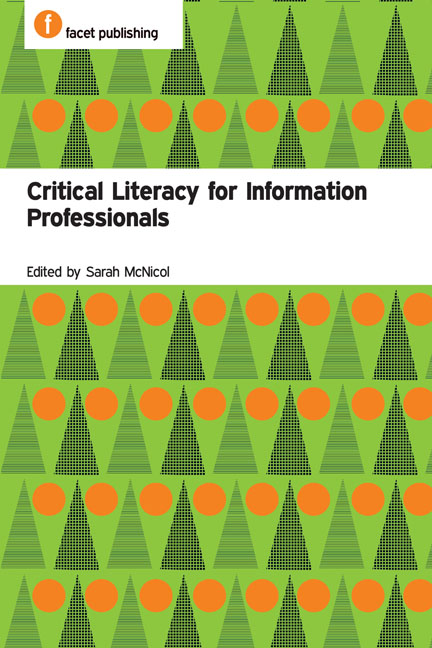Book contents
- Frontmatter
- Contents
- Contributors
- Introduction
- PART 1 THEORIES OF CRITICAL LITERACY
- 1 Renegotiating the place of fiction in libraries through critical literacy
- 2 Death of the author(ity): repositioning students as constructors of meaning in information literacy instruction
- 3 Reading health-education comics critically: challenging power relationships
- 4 Reframing librarians’ approaches to international students’ information literacy through the lens of New Literacy Studies
- 5 Using new literacies to discuss disability in the library
- 6 ‘Anyone can cook’: critical literacy in the workplace
- 7 Social justice, adult learning and critical literacy
- PART 2 CRITICAL LITERACY IN PRACTICE
- Further information
- Index
4 - Reframing librarians’ approaches to international students’ information literacy through the lens of New Literacy Studies
from PART 1 - THEORIES OF CRITICAL LITERACY
Published online by Cambridge University Press: 08 June 2018
- Frontmatter
- Contents
- Contributors
- Introduction
- PART 1 THEORIES OF CRITICAL LITERACY
- 1 Renegotiating the place of fiction in libraries through critical literacy
- 2 Death of the author(ity): repositioning students as constructors of meaning in information literacy instruction
- 3 Reading health-education comics critically: challenging power relationships
- 4 Reframing librarians’ approaches to international students’ information literacy through the lens of New Literacy Studies
- 5 Using new literacies to discuss disability in the library
- 6 ‘Anyone can cook’: critical literacy in the workplace
- 7 Social justice, adult learning and critical literacy
- PART 2 CRITICAL LITERACY IN PRACTICE
- Further information
- Index
Summary
Introduction
International students play a vibrant role within today's globally focused systems of higher education. Enriching both the academic and the cultural climate, international student numbers are growing, with over 850,000 studying in the United States alone in 2013/14 (Institute of International Education, n.d.). These figures have led to a sharp increase in librarian engagement in the field, with tours, workshops and instruction sessions positioned as some of the most important ways to support the growing presence of international students on campus (Bordonaro, 2013; Witt et al., 2015). Yet, while these developments have created renewed interest in the field, a failure to engage with research that positions information literacy as a complex social practice has led to the widespread belief that international student difference represents a learning difficulty that needs to be corrected. In turn, this problem-deficit stance has created what have been termed essentialist stereotypes of international students and fossilized models of instruction (Conteh-Morgan, 2003) that fail to account for the diversity of today's multicultural societies.
This chapter aims to address the shortcomings of these instructional approaches and models by exploring information literacy through the lens of New Literacy Studies. Characterized as a group of theories that emphasizes the ‘social and cultural contexts in which literacy is practised’ (Perry, 2012, 51), New Literacy Studies has not been widely explored within information literacy, despite the important role that it has played in the development of more culturally inclusive approaches to literacy studies more generally. Accordingly, this chapter will start by providing an overview of New Literacy Studies. It will then explore common observations related to international students’ information literacy through the lens of New Literacy Studies before offering a number of recommendations for future research and practice. In doing so, this research challenges librarians to reconsider the way that they conceptualize and teach international student information literacy.
New Literacy Studies
Traditionally, literacy has been understood as the acquisition of functional reading and writing skills. Measured through the assessment of tasks and characterized as a series of technical competencies that students have to master in the right order (Barton, 2007, 11), these ideas draw from cognitive and psychological perspectives of learning to position literacy as an individual skill that can be applied in any situation (Perry, 2012, 53).
- Type
- Chapter
- Information
- Critical Literacy for Information Professionals , pp. 43 - 56Publisher: FacetPrint publication year: 2016
- 4
- Cited by



